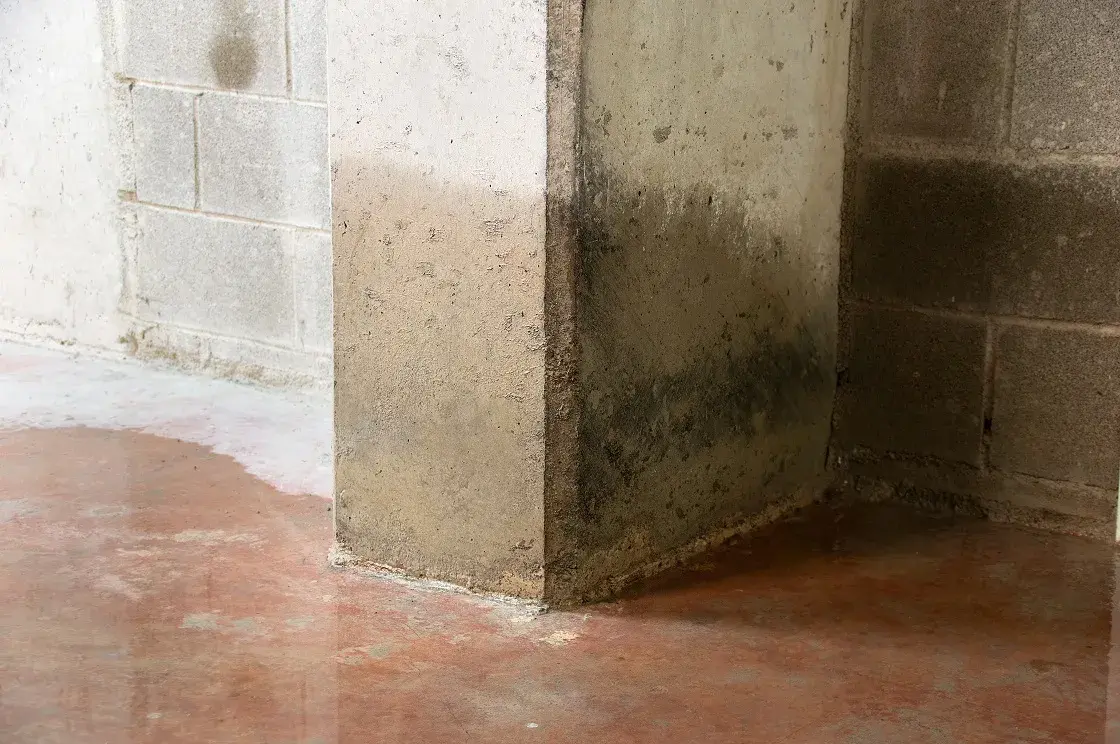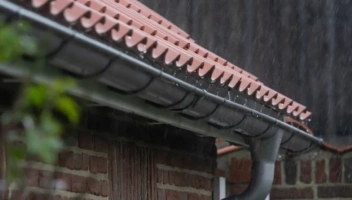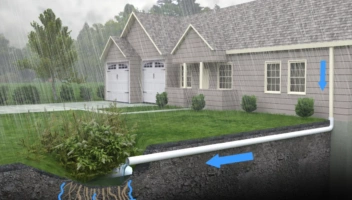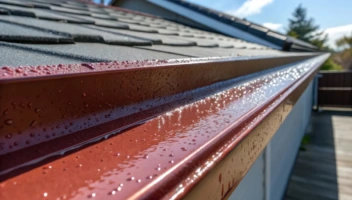Water Seeping Through Slab Foundation: How To Stop It

If every time you go to the basement to do laundry, it smells like an underwater cave, you could have water seeping through your slab foundation. How you stop it from happening depends on the cause of the unpleasant aroma that’s making your nose twitch.
Stopping water from seeping through your slab foundation may require multiple steps that range from the simple to the complex. From coating your basement in a water sealant to hiring a company to dig a large trench for a new drainage system, there’s a wide range of options for a homeowner.
It helps to know what to look for if you suspect water is seeping through your home’s foundation. Though the most common cause is hydrostatic pressure, other reasons could include faulty appliances or clogged gutters. (Call us today!) Our team of local professionals can inspect your gutters and put your mind at ease.)
To better prepare you for the risk of a basement flood, we’ll walk you through some of the ins and outs of water seepage through a slab foundation:
- Signs to Look (and Smell) For
- Causes of Water Seepage
- How to Stop Water Seeping Through
- Risks of Water Damage
- Final Thoughts
- Frequently Asked Questions
Signs to Look (and Smell) For

It’s not always obvious that water is seeping through your slab foundation. Some signs are hard to miss—for example, mold growing along the walls—while others are easy to miss, such as over-saturated ground. Keep an eye, ear, and nose out for the following:
- Musty odors
- Cracks in the foundation
- Dripping or bubbling noises
- Buckling or bulging flooring
- Deterioration in basement corners
- Warped door jams or window frames
- Damage to personal property
- Pest infestations
- Mold and mildew growth
Causes of Water Seepage

The top reason water seeps through a slab foundation is hydrostatic pressure. This happens when over-saturated soil increases pressure against the foundation (especially after heavy rain), either the walls or underneath, and the pressure builds, causing cracks or lines to form in the foundation where water seeps through.
Since water weighs just over 62 pounds per cubic foot, this action could cause enormous amounts of pressure pushing against your foundation. And because concrete is a porous, breathable material, it’s susceptible to damage from water saturation.
Other reasons water seeps through a slab foundation include:
- A damaged roof may result in cracks or missing shingles, which could let water in.
- Missing or clogged gutters and downspouts can lead to water overflow that pools on the ground near your foundation.LeafFilter gutter guards are guaranteed to keep your gutters clog-free, eliminating the need to clean out your gutters. You can then enjoy the freedom and peace of mind that comes with saving time and money that would otherwise be spent on this messy chore.
- Leaky gaps where pipes join with the wall or floor.
- Water leaking into the space between the slab foundation and foundation wall.
- Foundation cracks and small fissures along the walls or floor.
- Deteriorating concrete, typically in the cove joints (corners of your basement floor).
- Excess groundwater may enter between the foundation and first floor due to improper drainage.
- Improperly sealed windows in the foundation.
- Lack of waterproofing or old waterproofing leaves the basement vulnerable and may need an update.
- Bush or tree roots under or near the foundation can either damage the foundation from physical pressure or from holding excess water, causing increased soil pressure.
- The regular breakdown and wear-and-tear of concrete, which is porous, can result in crumbling concrete that takes on water like a sponge.
- A repeating freeze-thaw cycle in the ground soil results in frequent, fluctuating pressure. Over time, this back and forth can lead to gaps or hydrostatic pressure, speeding up the normal wear-and-tear of the concrete. (The freeze-thaw cycle can impact your gutter system, too.)
Attention homeowners! 🏡 Did you know that LeafFilter offers FREE estimates for your gutter protection needs? Say goodbye to clogs and hello to peace of mind with LeafFilter!✅ To learn more and get started today, visit https://t.co/6tWbQ0wMvX #ClogFree #FreeEstimate #LeafFilter pic.twitter.com/9JOuBzi7Mp
— LeafFilter Gutter Protection (@LeafFilter) July 18, 2023
How to Stop Water Seeping Through
You have two options when it comes to stopping water from seeping through the slab foundation. The first addresses standing water and fixes an immediate basement flood. The second option is to prevent water seepage.
Option 1: Standing Water Removal
Turn off all utilities so it’s safe to enter your flooded basement. Consider a sump pump (if your electricity is on) or a gas-powered pump to siphon water out of your basement. These pumps sit in a hole in your basement.
As the hole fills with excess water, it triggers the pump to pump water out of the hole to another location on your property via underground pipes. If you don’t have a pump on hand, consider removing standing water with a wet/dry vacuum, dehumidifier, buckets, and fans.
Option 2: Basement Waterproofing
Basement waterproofing can include the following measures:
- Topical concrete sealant
- Vapor barriers – a thin sheet of polyethylene that covers the foundation walls to funnel excess moisture into an underground drainage system
- Drainage systems – under the slab or outside the foundation walls so excess water is funneled away from the foundation to another area of your property
- Dry wells, creeks, or ponds
Most waterproofing is best done by a professional, especially if excavation is needed.
Risks of Water Damage

What happens if you ignore the problem? No one wants to deal with a dark, wet basement, but you’ll face more serious consequences if you ignore water damage.
Some risks include:
- Mold and mildew
- Health problems
- Rotting wood
- Pest infestations
- Electrical malfunctioning
- Warped doors and windows
- Cracked or buckled flooring
Unfortunately, the bottom line is that water in your basement simply can’t be ignored, and procrastination will only worsen the problem.
Final Thoughts
The old adage that says an ounce of prevention is worth a pound of cure is certainly true in this scenario. Having LeafFilter gutter guards professionally installed can help prevent water from pooling on the ground by ensuring your gutters remain clog-free.
Our patented, award-winning technology blocks even the smallest debris, including shingle grit and pollen, from entering your gutters, allowing only water to flow through. Plus, each professional installation is backed by a limited lifetime transferable warranty, so you can rest easy knowing your home is protected from the serious water damage clogged gutters can cause.
To learn more about how LeafFilter gutter guards can help, call us today at 1-844-645-1739, or check out all of our gutter guard locations to find installation near you!
Frequently Asked Questions
How do you stop water from seeping through concrete slab?
The best way is to waterproof your basement to prevent leaks and floods. From making minor adjustments to the inside to upgrading the outside of your home, you can avoid a disaster by taking a few preventive measures. If you already have standing water in your basement, you’ll need to remove it and divert it away from your home.
How do you fix a water leak in a slab foundation?
A simple water leak in a slab foundation may be fixed with sealant. Keep in mind the foundation needs to be dry before the sealant is applied.
How do you fix water seeping under the foundation?
Chances are, if water is seeping under the foundation, hydrostatic pressure is to blame. Over-saturated soil pushes against your foundation, causing it to weaken and possibly crack, taking on excess groundwater.
How do you waterproof a slab foundation?
Waterproof a slab foundation with sealants and coatings meant to keep moisture out. For more foolproof methods, consider redoing your property to slope the land away from your home.


